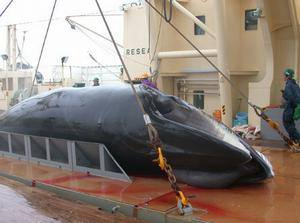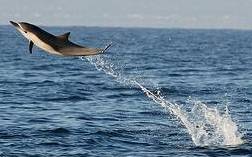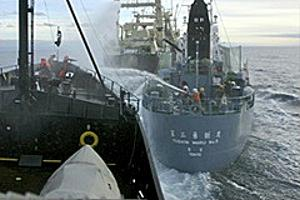國際捕鯨委員會(International Whaling Commission, IWC)于本月26日公佈的一份文件顯示,日本獵殺的鯨魚比任何其他國家都來得多。儘管日本簽署了在1986年開始實施的「國際商業捕鯨禁令,」至今,日本在該公約中一項豁免科學研究用途捕鯨的條例下,已經捕殺了約12,000頭鯨魚。
為期一周的年會上,捕委會發表的文件中揭露了「捕委會成員國在2008和2008/2009年間的捕撈量。」1,936頭被捕獲的鯨魚總數裏,其中1,004頭為日本所捕殺。
國際綠色和平組織Greenpeace International的霍爾頓(Sara Holden),出席這次在馬德拉(Madeira)舉辦的國際捕委會年會時表示:「日本假借"科學"捕鯨計劃的名義,繼續以其他國家如挪威和冰島所無法比擬的規模大肆捕鯨。這些國家在1982年捕委會會議上都拒簽暫停商業捕鯨協議。」
另一份由日本政府提供,于本月23日的會議中公開有關其2008-09年在南極的捕鯨報告結果顯示,遭獵殺的懷孕與哺乳中的鯨魚比例偏高。
據報,在南大洋遭捕殺的679頭鯨魚中,一部分還是在澳洲的鯨魚保護區内遭害,304頭是母鯨,其中,192頭和4頭正處於懷孕與哺乳期。
頑固的捕鯨國
國際捕鯨委員會的85個成員國,繼過去一年來的閉門協商,未能達成讓日本、冰島、挪威等捕鯨國,同意遵守捕委會的科學程序和商業捕鯨禁令的規定之下,于本月22日拉開第61屆年度會議的序幕。
國際捕鯨委員會的「未來行動小組」,周旋於捕鯨與護鯨國之間,試圖解決分歧,但卻無功而返。甚至連在處理問題的作法上都無法達成任何共識。
日本使團代表中前(Akira Nakamae)表示:「如同其他生物資源,若建立在最精確的科學佐證,和利用最佳工具的基礎上,兩者併用,的確可以達到可持續性捕鯨的目的。日本對此做法已表認同,包括在捕鯨船隻上安排國際觀察員、部署衛星導航的即時船隻監測系統、DNA指紋辨識的市場監管機制等等。」
但是,日本的立場卻未能贏得大多數人的支持。捕委會的成員只同意向後推遲一年,決定是否允許日本在其沿海水域捕鯨,以換取日本減少或停止在南冰洋的「研究捕鯨」行爲。
國際動物福利基金會(International Fund for Animal Welfare)全球鯨魚計劃執行長拉馬治(Patrick Ramage)以保育者的觀點表示,「這樣的交易將違反禁令和現行的科學程序、使日本頂著"科學"名義捕鯨的行爲合法化、枉顧捕委會科學委員會幾十年來努力的心血。此刻該擺脫的是商業捕鯨,而不是捕鯨禁令。」
賞鯨--朝陽工業
根據國際動物福利基金會本月24日公佈的一份報告記錄,全球賞鯨業過去十年來呈現增長的態勢。
由澳洲墨爾本經濟學人及夥伴,分別以國為單位所做的經濟分析顯示,去年在全世界119個國家中,有1,300多萬人參與了賞鯨的活動。在2008年創造高達15億元的門票和旅遊花費。
人道協會為呼籲設立全球鯨魚保護區所提出的請願書,正送往捕委會成員國的領導人手中。目的為推動保護和賞鯨的行爲,一種比捕鯨來得更人道和科學的替代經濟活動。
澳洲成立保護小鯨魚基金
澳洲環境部長加勒特(Garrett)承諾撥款50萬澳幣,協助拯救小型鯨類。這筆錢將全數供捕委會的小型鯨類動物基金運作之用。
 世界自然基金會(WWF)的報告指出,儘管大型鯨魚現在多少受到商業捕鯨禁令的保護,然而捕殺小型鯨類的行爲,卻在許多國家持續地上演。在很大程度上,不受國際社群的監管。
世界自然基金會(WWF)的報告指出,儘管大型鯨魚現在多少受到商業捕鯨禁令的保護,然而捕殺小型鯨類的行爲,卻在許多國家持續地上演。在很大程度上,不受國際社群的監管。
此外,基金會于25日警告說,生活在柬埔寨和寮國之間,湄公河部分河段地區的海豚,由於污染而導致瀕臨滅絕。」
基金會的研究人員取自2004年至2006年間21個死亡海豚的分析中,發現高濃度殺蟲劑毒性的含量,如DDT和環境污染物如多氯聯苯以及汞。
海洋守護協會2009年南大洋「研究」遠征計劃
船長華生(Paul Watson)說,海洋守護協會帶著一艘新的,更快的船舶,以及其旗艦船艾爾文號(Steve Irwin),重新整頓後,將于12月返回南大洋,阻止日本捕鯨船隊獵殺鯨魚。
他說:「這是一項研究計劃,」説時臉上帶著一抹微笑。「我們決定要示範操作與日本、澳洲、紐西蘭團結一致的研究計劃。我們的主要目標就是研究非致命性捍衛鯨魚的手段。」
屆時還有動物星球頻道(Animal Planet)的攝影團隊,隨行攝製第三季「鯨魚之戰」 的一系列紀錄片。影片會在發現(Discovery)頻道播放。
A paper released today by the International Whaling Commission shows that Japan kills more whales than any other country, although Japan is a signatory to the international ban on commercial whaling, which took effect in 1986. Since then, Japan has killed about 12,000 whales, under a provision in the convention which permits whaling for scientific research purposes.
The paper "Catches by IWC member nations in the 2008 and 2008/2009 seasons," released by the commission at its week-long annual meeting shows that Japan killed 1,004 whales out of a total of 1,936 whales killed during this period.
"Japan's fraudulent 'scientific' whaling program continues to be on a scale unmatched by other countries like Norway or Iceland which refused to sign onto the moratorium on commercial whaling in 1982 at the IWC," said Sara Holden of Greenpeace International, who is in Madeira for the IWC annual meeting.
A separate report provided by the Japanese government about its 2008-09 whale hunt in Antarctica, made public at the IWC meeting Tuesday, shows that a high number of pregnant and lactating females were killed.
Of 679 whales reported killed in the Southern Ocean, part of which is an Australian Whale Sanctuary, 304 were female, and of these, 192 were pregnant and four were lactating.
Whaling Nations Adamant
The commission's 85 member governments opened the 61st IWC annual meeting Monday, after a year of closed-door discussions that have failed to secure agreement from whaling nations Japan, Iceland and Norway to respect the commission's scientific procedures and commercial whaling ban.
The Small Working Group on the Future of the International Whaling Commission, SWG, has attempted to resolve the fracture between whaling nations and conservation nations. But the group has reached no agreement on the shape of a core package or even on the concept of how to approach the issues.
"Like other living resources, whales can be utilized in a sustainable manner, when appropriate conservation and management measures, based on best scientific evidence and with the best available tools, are applied," said Akira Nakamae, who heads the Japanese delegation. "Japan has expressed its willingness to accept such measures, including the placement of international observers on board whaling vessels, the deployment of satellite based real-time vessel monitoring systems, market monitoring with DNA finger prints, among others."
But Japan's position failed to attract majority support. IWC members could only agree to postpone for one year the decision on whether to allow Japan to hunt whales in its coastal waters in return for scaling down or ending its "research whaling" in the Antarctic Ocean.
Patrick Ramage, whale program director for International Fund for Animal Welfare, expressed the conservationist point of view. "Such a deal would violate the moratorium and established scientific procedures, legitimize Japan's ongoing 'scientific' whaling and ignore decades of work by the IWC Scientific Committee. It's time to get rid of commercial whaling, not the whaling ban."
Whale Watching a Growth Industry
A new report released Wednesday by the International Fund for Animal Welfare documents growth in the global whale watching industry over the past decade.
The country-by-country economic analysis by Economists at Large and Associates of Melbourne, Australia shows more than 13 million people took whale watching tours last year in 119 countries worldwide, generating ticket fees and tourism expenditures of more than 1.5 billion during 2008.
An Humane Society petition calling for a global whale sanctuary is being sent to leaders of IWC member countries to promote sanctuaries and whale watching as a more humane and scientifically sound economic alternative to whale hunting.
Australia Funds Small Whale Conservation
Australia's Environment Minister Garrett pledged AU$500,000 (284,927) to help save these smaller cetaceans.
The money will be dedicated to the IWC's Small Cetacean Fund. The WWF report states that while great whales are now somewhat protected by the international commercial whaling moratorium, small cetacean hunts continue in many countries, largely unmanaged and unchecked by the international community.
In addition, dolphins living in parts of the Mekong River between Cambodia and Laos are on the brink of extinction due to pollution, WWF warned Friday.
WWF researchers found high toxic levels of pesticides such as DDT and environmental contaminants such as PCBs along with mercury in its analysis of 21 dead dolphins retrieved between 2004 and 2006.
Sea Shepherd Plans Its 2009 Southern Ocean 'Research' Expedition
With a new, faster ship as well as its flagship Steve Irwin, the Sea Shepherd Conservation Society will return to the Southern Ocean in December to renew its efforts to keep the Japanese whaling fleet from killing whales, Captain Paul Watson said today.
"This is a research project," said Watson, with a smile. "We've decided to demonstrate our solidarity with the Japanese, Australian and New Zealand Research projects. Our primary objective is to research non-lethal means for defending whales.
On board will be an Animal Planet film crew to document the third season of the documentary series "Whale Wars," shown on the Discovery Channel.




